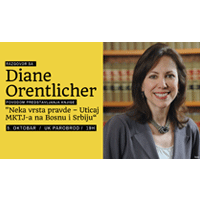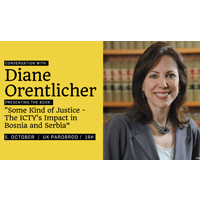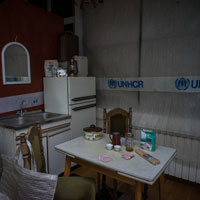
 On October 5th, on the occasion of the presentation of her new research published in the book “Some Kind of Justice – The ICTY’s Impact in Bosnia and Serbia”, the Humanitarian Law Center will host professor Diane Orentlicher.
On October 5th, on the occasion of the presentation of her new research published in the book “Some Kind of Justice – The ICTY’s Impact in Bosnia and Serbia”, the Humanitarian Law Center will host professor Diane Orentlicher.
Diane Orentlicher, Professor of International Law at American University, has been described by the Washington Diplomat as “one of the world’s leading authorities on human rights law and war crimes tribunals.” She has lectured and published widely on issues of transitional justice, international criminal law. Professor Orentlicher has served in various public positions, including as the Deputy for War Crimes Issues in the U.S. Department of State; United Nations Independent Expert on Combating Impunity, and Special Advisor to the High Commissioner on National Minorities of the Organization for Security and Co-operation in Europe.
In her new book, Professor Orentlicher offers a groundbreaking and timely account of how an international criminal tribunal affects local communities and the factors that account for its changing impact over time. Through an in-depth case study, „Some Kind of Justice“ offers fresh insights about two questions now the subject of robust debate: What goals can we plausibly assign to international criminal tribunals? What factors determine the impact of distant courts on societies that have seen vicious violence? The book explores the influence of the International Criminal Tribunal for the former Yugoslavia, launched in 1993 by the UN Security Council at the height of ethnic conflict accompanying the breakup of Yugoslavia, in two countries directly affected by its work. One, Bosnia-Herzegovina, experienced soaring levels of ethnic violence, culminating in the 1995 genocide in Srebrenica. The wartime government of the other country, Serbia, plunged the region into conflict. Scheduled to close at the end of 2017, the ICTY is the longest-running war crimes tribunal in history, and thus offers an incomparably rich case study of how a Nuremberg-inspired tribunal influences societies emerging from ruinous violence.
This will be an opportunity to discuss how the ICTY also impacted other post-Yugoslav states. Our interlocutors will include:
- Hrvoje Klasić, Historian, University of Zagreb, Croatia
- Erna Mačkić, BIRN, BH
- Adriatik Kelmendi, journalist, Kosovo
- Nemanja Stjepanović, journalist, Serbia
The book presentation and a debate will take place on October 5th 2018, at the Cultural Center „Parobrod“, starting at 7 p.m.

 On October 16, 2018, the Humanitarian Law Center (HLC) filed a criminal complaint with the Office of the War Crimes Prosecutor (OWCP) of the Republic of Serbia against several unknown persons, for killing three members of the Matijević family in April 1992 in Kukujevci (Municipality of Šid, Serbia).
On October 16, 2018, the Humanitarian Law Center (HLC) filed a criminal complaint with the Office of the War Crimes Prosecutor (OWCP) of the Republic of Serbia against several unknown persons, for killing three members of the Matijević family in April 1992 in Kukujevci (Municipality of Šid, Serbia).







 From September 25 to October 6, 2018, the Humanitarian Law Center (HLC) and the History Museum of Bosnia and Herzegovina presented in Belgrade a part of the museum’s permanent exhibition, entitled “Besieged Sarajevo”. With photographs, documents, and hand-made items made by citizens of Sarajevo, the exhibition depicts life in the city that the Republika Srpska Army (RSA) kept under siege for 44 months. Visitors could see what life in a city without water, electricity and heating looked like, how schools operated, how children played, and how food was procured, along with other daily activities in the city that, despite everyday sniper attacks from the surrounding hills, sought to preserve the illusion of a normal life.
From September 25 to October 6, 2018, the Humanitarian Law Center (HLC) and the History Museum of Bosnia and Herzegovina presented in Belgrade a part of the museum’s permanent exhibition, entitled “Besieged Sarajevo”. With photographs, documents, and hand-made items made by citizens of Sarajevo, the exhibition depicts life in the city that the Republika Srpska Army (RSA) kept under siege for 44 months. Visitors could see what life in a city without water, electricity and heating looked like, how schools operated, how children played, and how food was procured, along with other daily activities in the city that, despite everyday sniper attacks from the surrounding hills, sought to preserve the illusion of a normal life. 
 On October 5th, on the occasion of the presentation of her new research published in the book “Some Kind of Justice – The ICTY’s Impact in Bosnia and Serbia”, the Humanitarian Law Center will host professor Diane Orentlicher.
On October 5th, on the occasion of the presentation of her new research published in the book “Some Kind of Justice – The ICTY’s Impact in Bosnia and Serbia”, the Humanitarian Law Center will host professor Diane Orentlicher.

